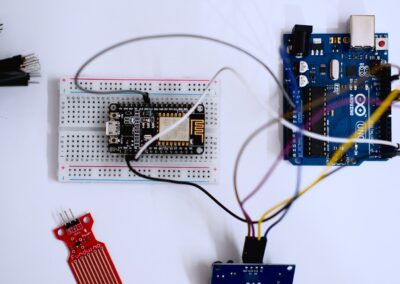The Importance of a Structured Firmware Update Schedule
Enhancing Security through Regular Firmware Updates
Establishing a firmware update schedule for IoT devices is critical for maintaining the security and functionality of these interconnected systems, particularly in advanced regions like Saudi Arabia and the UAE. As IoT devices become integral to business operations and daily life, ensuring they receive timely security updates is paramount. Firmware updates address vulnerabilities, enhance performance, and introduce new features, significantly reducing the risk of cyberattacks.
Regular firmware updates are essential for protecting IoT devices from emerging threats. Cybercriminals constantly evolve their tactics, exploiting any weaknesses in device firmware. By adhering to a structured update schedule, businesses can ensure that their IoT devices are equipped with the latest security patches, mitigating potential risks. For example, in smart cities like Riyadh and Dubai, where IoT devices manage critical infrastructure, regular updates can prevent disruptions and enhance the resilience of these systems against cyber threats.
Furthermore, consistent updates improve the overall performance and reliability of IoT devices. Firmware updates often include bug fixes and performance enhancements that optimize device functionality. This not only prolongs the lifespan of the devices but also ensures that they operate efficiently. In industries such as healthcare and logistics, where IoT devices play a crucial role in operations, maintaining optimal performance through regular updates is essential for business success.
Key Factors in Creating an Effective Firmware Update Schedule
When creating a firmware update schedule for IoT devices, several factors must be considered to ensure its effectiveness. First, businesses need to assess the criticality of their IoT devices and prioritize updates accordingly. Devices that manage sensitive data or critical infrastructure should be updated more frequently to ensure they are always protected against the latest threats. This prioritization helps allocate resources efficiently and minimizes downtime during the update process.
Compatibility is another crucial factor. Before deploying updates, businesses must ensure that the new firmware is compatible with the existing hardware and software environment. Compatibility testing prevents potential conflicts that could disrupt operations. For instance, in the UAE’s rapidly growing tech sector, ensuring that updates do not interfere with other systems is vital for maintaining seamless operations across interconnected networks.
Automating the update process is also beneficial. Automation reduces the risk of human error and ensures that updates are deployed consistently across all devices. Automated systems can schedule updates during off-peak hours to minimize disruptions. Additionally, they can verify the success of the update, ensuring that all devices are running the latest firmware. This approach is particularly useful for large-scale IoT deployments in cities like Dubai, where managing updates manually would be impractical.
Leveraging Advanced Technologies for Firmware Management
Advanced technologies such as AI and blockchain can further enhance the management of firmware updates in IoT devices. AI can predict when updates are needed by analyzing usage patterns and identifying potential vulnerabilities. This proactive approach ensures that devices are updated before issues arise, enhancing security and performance. For example, AI-driven systems can detect anomalies in device behavior that may indicate the need for a security patch, enabling timely updates.
Blockchain technology offers a secure and transparent method for managing firmware updates. By recording update transactions on a blockchain, businesses can create an immutable ledger that tracks the history of updates for each device. This transparency ensures accountability and prevents tampering. In smart cities like Riyadh and Dubai, where the integrity of IoT systems is paramount, blockchain can provide a robust framework for managing and verifying firmware updates.
Executive coaching services can help business leaders understand and implement these advanced technologies. By providing strategic guidance, executive coaches can assist leaders in developing effective firmware update schedules that leverage AI and blockchain. This support is crucial in fast-paced environments like those in Saudi Arabia and the UAE, where staying ahead of technological trends is essential for maintaining a competitive edge.
Strategic Approaches for Business Success through IoT Security
Developing a Comprehensive Firmware Update Strategy
A well-defined strategy is essential for successfully implementing a firmware update schedule for IoT devices. Business leaders in Riyadh and Dubai must prioritize the development of comprehensive security strategies that align with their organizational goals and technological capabilities. This involves conducting thorough risk assessments to identify potential vulnerabilities and implementing robust frameworks that encompass firmware management, device authentication, and secure communications.
Key to this strategy is the integration of executive coaching services, which provide invaluable support in developing and executing these plans. Coaches offer insights into best practices for IoT security, helping leaders navigate challenges and optimize their strategies. This support is particularly important in the fast-paced business environments of Saudi Arabia and the UAE, where staying ahead of technological trends is crucial for maintaining a competitive edge.
Additionally, fostering a culture of security awareness is vital for the success of IoT security initiatives. Regular training and awareness programs for employees can ensure that everyone understands the importance of firmware updates and follows best practices. This collaborative approach fosters a proactive security culture, where potential threats are identified and addressed promptly.
Continuous Improvement and Adaptation in Firmware Management
The dynamic nature of technology necessitates a commitment to continuous improvement and adaptation in firmware management. Organizations in the UAE and Saudi Arabia must regularly review and update their firmware management strategies to keep pace with evolving threats and technological advancements. This involves staying informed about the latest security trends and incorporating new technologies and methodologies to enhance the effectiveness of IoT security measures.
Continuous improvement also requires ongoing training and development for employees. Executive coaching services facilitate this by providing tailored training programs that enhance the skills and knowledge of business leaders and their teams. By fostering a culture of continuous learning, organizations ensure they remain agile and responsive to changes in the technological landscape. This adaptability is crucial for maintaining robust IoT security in the long term.
Moreover, leveraging data analytics to assess the performance of firmware management measures is essential. Regular analysis of key performance indicators (KPIs) provides insights into the effectiveness of implemented strategies and identifies areas for improvement. By using data-driven insights to guide decision-making, organizations can continuously refine their IoT security measures, ensuring optimal performance and protection against data breaches.
Building a Secure and Future-Ready IoT Infrastructure
As we look to the future, establishing a robust firmware update schedule will be essential for building a secure and future-ready IoT infrastructure. In the innovative landscapes of Riyadh and Dubai, where technology is a key driver of economic growth, businesses must prioritize IoT security to stay competitive. Leveraging advanced technologies such as AI and blockchain, and investing in executive coaching services, organizations can develop robust strategies that enhance the security and reliability of their IoT networks.
The focus on firmware updates not only protects sensitive data but also supports broader business goals such as operational efficiency and customer trust. As businesses in Saudi Arabia and the UAE continue to embrace digital transformation, securing IoT networks through regular firmware updates will be critical for achieving long-term success. By fostering a culture of innovation and continuous improvement, organizations can navigate the complexities of IoT and lead the way in technological advancements.
In conclusion, establishing a firmware update schedule for IoT devices is vital for ensuring regular security enhancements and maintaining the reliability of IoT systems. For businesses in Riyadh, Dubai, and beyond, adopting best practices and advanced strategies for firmware management is essential for maintaining a competitive advantage and driving sustainable growth. With the support of executive coaching services and the integration of advanced technologies, organizations can build secure and reliable IoT systems that support their strategic objectives and pave the way for future innovations.
—
#FirmwareUpdateSchedule #IoTSecurity #DeviceAuthentication #SecureCommunications #Cybersecurity #AI #Blockchain #ExecutiveCoaching #Leadership #DubaiTech #RiyadhInnovation































